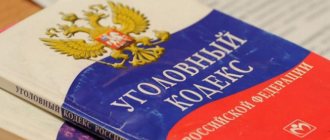Responsibility of parents for non-fulfillment or improper fulfillment of parental responsibilities
The legislation of the Russian Federation provides for various types of liability for failure to fulfill or improper fulfillment of one’s duties in raising children.
Criminal liability
Article 156 of the Criminal Code of the Russian Federation provides for criminal liability for failure to fulfill or improper fulfillment of duties for the upbringing of a minor by a parent or other person entrusted with these duties, as well as by a teacher or other employee of an educational, training, medical or other institution obliged to supervise a minor, if this the act is connected with cruel treatment of a minor.
Article 157 of the Criminal Code of the Russian Federation provides for criminal liability for malicious evasion of a parent from paying alimony: “Malicious evasion of a parent from paying, by a court decision, funds for the maintenance of minor children, as well as disabled children who have reached the age of eighteen” is punishable by correctional labor for up to one year, or forced labor labor for the same period, or arrest for a term of up to three months, or imprisonment for a term of up to one year.
Civil liability
For failure to fulfill or improper fulfillment of responsibilities for raising children, parents can also be brought to civil liability.
The possibility of recovering compensation in favor of a child for causing moral or property damage to him is not directly provided for by family law, but follows from the provisions of Art. 151, 1064, 1099 Civil Code of the Russian Federation. A parent who has committed violations of his duties, has not fulfilled his obligations to provide the child with food and clothing, which resulted in harm to the child’s health, may be brought to civil liability in the form of compensation for moral damage and damages.
In accordance with Art. 69 of the Family Code of the Russian Federation, parents (one of them) may be deprived of parental rights if they:
- evading the duties of parents, including malicious evasion of alimony payments;
- refuse, without good reason, to take their child from a maternity hospital (ward) or from another medical institution, educational institution, social welfare institution or similar organizations;
- abuse their parental rights;
- children are cruelly treated, including physical or mental violence against them, and attacks on their sexual integrity;
— are patients with chronic alcoholism or drug addiction;
- committed a deliberate crime against the life or health of their children or against the life or health of their spouse.
Administrative responsibility
Article 5.35 of the Code of Administrative Offenses of the Russian Federation “Failure of parents or other legal representatives of minors to fulfill obligations for the maintenance and upbringing of minors” the offense consists of the inaction of parents or other legal representatives of minors, i.e. when they deliberately do not fulfill their responsibilities for raising and educating children: they do not care about the moral education, physical development of children and strengthening their health, creating the necessary conditions for their timely receipt of education, successful training, etc.
Article 20.22 of the Code of Administrative Offenses of the Russian Federation provides for the responsibility of parents or other legal representatives for the appearance of minors under the age of 16 in a state of intoxication, as well as for their drinking beer, alcoholic beverages, and the use of narcotic and intoxicating substances in public places. From the age of 16, a minor himself bears administrative responsibility for these offenses.
In addition to parents, guardians and trustees, adoptive parents, and persons who have adopted children may be held liable.
For committing offenses under Article 5.35 and Article 20.22 of the Code of Administrative Offenses of the Russian Federation, punishment is provided in the form of a fine from 100 to 500 rubles (Part 1 of Article 5.35) and from 300 to 500 rubles (Article 20.22).
Cases of administrative offenses are considered by the commission for the affairs of minors and the protection of their rights at the place of residence of the person in respect of whom proceedings are being conducted on the case of an administrative offense. The commission makes a decision either to terminate the proceedings or to prosecute the person, indicating the type and amount of punishment.
Grounds for parental rights
According to family law, a child has the right to be raised by both parents, regardless of whether they are married or divorced.
All issues related to the upbringing of common children are resolved by both parents by mutual consent and taking into account the opinions of minors.
If parents have questions about how to raise their children, they resolve them through negotiations. If it is impossible to resolve the dispute peacefully, parents have the right to appeal to the guardianship authority or to court.
The basis for the emergence of parental rights is their legally established blood relationship, that is, the origin of the child from a specific mother and father.
The origin of a child from a specific mother is established on the basis of a medical birth certificate confirming the birth of the child by the mother in a medical organization. If a child is born outside a medical organization, the fact of the child’s origin from the mother is confirmed on the basis of medical documents, witness testimony or other evidence.
The father of the child is recognized as the husband of the child's mother, and the fact of registration of marriage between them must be documented by a marriage certificate.
Please note: if a child was born within three hundred days after the divorce, then the former spouse of the child’s mother is automatically recognized as the father.
If a child was born to unmarried persons, then paternity is established by submitting a joint application from the mother and father to the registry office.
It is important to know : if a child has reached the age of majority, then establishing paternity in his respect is allowed only with the consent of the adult.
The procedure for state registration of the birth of children is regulated by Federal Law dated November 15, 1997 No. 143-FZ “On Acts of Civil Status”. In accordance with the provisions of the above law, an entry about his parents is made in the birth certificate of the child. This record is documentary evidence of the relationship between parents and child.
Administrative responsibility of minors
Administrative liability is a type of legal liability, which is expressed in the application of administrative punishment to a person who has committed acts that are less dangerous to society than crimes.
An administrative offense is an unlawful, guilty action or inaction of an individual or legal entity for which administrative liability is established by the legislation on administrative offenses. The list of administrative offenses is enshrined in a special part of the Code of Administrative Offenses of the Russian Federation.
A person who has reached the age of sixteen at the time of committing an administrative offense is subject to administrative liability. Responsibility for an administrative offense committed by minors aged 14 to 16 years lies with parents or other legal representatives (guardians, trustees).
Article 2.3. Code of Administrative Offenses of the Russian Federation Age at which administrative responsibility begins:
1. A person who has reached the age of sixteen at the time of committing an administrative offense is subject to administrative liability.
2. Taking into account the specific circumstances of the case and data about the person who committed an administrative offense between the ages of sixteen and eighteen years, the commission on affairs of minors and the protection of their rights, this person may be released from administrative liability with the application to him of a measure of influence provided for by the federal legislation on protection of the rights of minors.
Administrative penalties for committing administrative offenses:
1) warning;
2) administrative fine;
3) confiscation of the instrument or subject of the administrative offense;
4) deprivation of a special right granted to an individual;
5) administrative arrest;
6) administrative expulsion from the Russian Federation of a foreign citizen or stateless person;
7) disqualification;
 administrative suspension of activities;
administrative suspension of activities;
9) compulsory work;
10) administrative ban on visiting the venues of official sports competitions on the days they are held.
In relation to minors, the current legislation provides a general rule according to which the measures provided for by the Regulations on Commissions for Minors and the Protection of Their Rights (hereinafter referred to as the CDN) are applied to persons aged 16 to 18 years who have committed administrative offenses:
1. Oblige the victim to make a public or other form of apology.
2. Issue a warning.
3. Announce a reprimand or severe reprimand,
4. Impose on a minor who has reached the age of 15 the obligation to compensate for the material damage caused.
5. Impose a fine on a minor who has reached the age of 16 and has independent income.
6. Place the minor under the supervision of parents or their substitutes, or public educators, as well as under the supervision of a work collective or public organization.
7. Transfer the minor to the custody of the work collective.
8. Send the minor to a special treatment and educational institution.
A fine may be imposed as a punishment if the minor has independent income or property. In the absence of independent earnings, a fine is collected from his parents or other legal representatives, which include parents, guardians and trustees.
An important feature of the responsibility of minors established by the Code of Administrative Offenses of the Russian Federation is that the commission of an administrative offense by a minor is recognized as a mitigating circumstance.
For committing illegal actions, gross and repeated violation of the school charter, a student who has reached the age of 14 may be expelled from school by decision of the school governing body. Local government bodies, together with the parents of the expelled student, take measures within a month to ensure his employment or continuation of education in another educational institution.
Expulsion of a minor from a comprehensive school is possible only with the consent of the commission on juvenile affairs.
Determining the child’s place of residence
Until the child is fourteen years old, he is registered at the place of residence of his parents. In this case, the consent of other persons living in this residential premises is not required.
In the event of divorce, the child remains to live at the place of residence of one of the parents. If a dispute arises between the parents about the future place of residence of the child, they have the right to enter into an appropriate agreement on the exercise of parental rights or go to court.
At the court hearing, the judge takes into account the child’s attachment to each of the parents, their financial condition and work schedule, and the presence of other minor children. If the child is 10 years old at the time of the dispute, the court also takes into account his opinion when resolving the conflict that has arisen.
Parents can also file a claim in court if a dispute arises about the child’s place of residence during the divorce process.
Please note : if the court satisfied one of the parents in the claim, the second is not deprived of the right to communicate with the child.
Parental rights
All rights inherent in a child are enshrined in the Family Code of the Russian Federation.
Minor children have the following rights:
- for last name, first name, patronymic;
- to protect honor and dignity;
- for protection from parental abuse;
- grow up and be brought up in a family;
- receive care from parents;
- receive preschool and school education;
- develop comprehensively;
- communicate with both parents and other relatives. At the same time, the dissolution of the parents’ marriage does not derogate from the child’s right to communicate with the separated parent;
- express your opinion when resolving family issues;
- be supported at the financial expense of the parents;
- receive property as a gift or inheritance;
- dispose of property owned by him;
- other rights provided by law.
All of the above rights of children for parents are inextricably linked with parental responsibilities, which must be performed in good faith.
Parental rights cease to apply when their children reach the age of majority, upon marriage or in other cases provided by law.
Exercise of parental rights to the detriment of the interests of the child
Parents do not have the right to cause physical pain or psychological trauma to their child, and parenting methods should not be cruel and rude.
If parents abuse the rights and interests of the child or do not fulfill parental responsibilities, then the child has the right to apply to the guardianship and trusteeship authority, and, if he reaches the age of fourteen, to the judicial authority for the protection of his rights.
It is important to know: abuse should be understood as the actions of parents that can harm both the personal and property rights of the child.
Criminal liability of minors
Compulsory educational measures may be applied to minors who have committed crimes or they may be sentenced, and if released from punishment by the court, they may also be placed in a special closed educational institution.
Persons who have reached the age of fourteen at the time of committing a crime are subject to criminal liability:
1. For murder (Article 105 of the Criminal Code of the Russian Federation);
2. Intentional infliction of grievous bodily harm (Article 111 of the Criminal Code of the Russian Federation);
3. Intentional infliction of moderate harm to health (Article 112 of the Criminal Code of the Russian Federation);
4. Kidnapping (Article 126 of the Criminal Code of the Russian Federation);
5. Rape (Article 131 of the Criminal Code of the Russian Federation);
6. Violent acts of a sexual nature (Article 132 of the Criminal Code of the Russian Federation);
7. Theft (Article 158 of the Criminal Code of the Russian Federation);
8. Robbery (Article 161 of the Criminal Code of the Russian Federation);
9. Robbery (Article 162 of the Criminal Code of the Russian Federation);
10. Extortion (Article 163 of the Criminal Code of the Russian Federation);
11. Wrongful taking of a car or other vehicle without the purpose of theft (Article 166);
12. Deliberate destruction or damage to property under aggravating circumstances (Part 2 of Article 167 of the Criminal Code of the Russian Federation);
13. Terrorist act (Article 205 of the Criminal Code of the Russian Federation);
14. Completion of training for the purpose of carrying out terrorist activities (Article 205.3 of the Criminal Code of the Russian Federation);
15. Participation in a terrorist community (Part 2 of Article 205.4 of the Criminal Code of the Russian Federation);
16. Participation in the activities of a terrorist organization (Part 2 of Article 205.5 of the Criminal Code of the Russian Federation);
17. Failure to report a crime (Article 205.6 of the Criminal Code of the Russian Federation);
18. Hostage taking (Article 206 of the Criminal Code of the Russian Federation);
19. Knowingly false report about an act of terrorism (Article 207 of the Criminal Code of the Russian Federation);
20. Participation in an illegal armed group (Part 2 of Article 208 of the Criminal Code of the Russian Federation);
21. Theft of an air or water transport vessel or railway rolling stock (Article 211 of the Criminal Code of the Russian Federation);
22. Participation in mass riots (Part 2 of Article 212 of the Criminal Code of the Russian Federation);
23. Hooliganism under aggravating circumstances (part 2, part 3 of Art. 213 of the Criminal Code of the Russian Federation);
24. Vandalism (Article 214 of the Criminal Code of the Russian Federation);
25. Illegal acquisition, transfer, sale, storage, transportation or carrying of explosives or explosive devices (Article 222.1 of the Criminal Code of the Russian Federation);
26. Illegal production of explosives or explosive devices (Article 223.1 of the Criminal Code of the Russian Federation);
27. Theft or extortion of weapons, ammunition, explosives and explosive devices (Article 226 of the Criminal Code of the Russian Federation);
28. Theft or extortion of narcotic drugs or psychotropic substances (Article 229 of the Criminal Code of the Russian Federation);
29. Putting vehicles or means of communication into disrepair (Article 267 of the Criminal Code of the Russian Federation);
30. Encroachment on the life of a state or public figure (Article 277 of the Criminal Code of the Russian Federation);
31. Attack on persons or institutions that enjoy international protection (Article 360 of the Criminal Code of the Russian Federation);
32. Act of international terrorism (Article 361 of the Criminal Code of the Russian Federation).
If a minor has reached the age provided for in Part 1, Part 2 of this article, but due to mental retardation not associated with a mental disorder, during the commission of a socially dangerous act, he could not fully understand the actual nature and social danger of his actions (inaction) ) or manage them, he is not subject to criminal liability.










